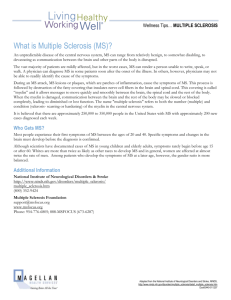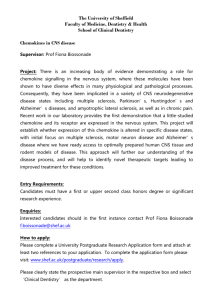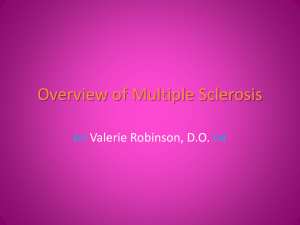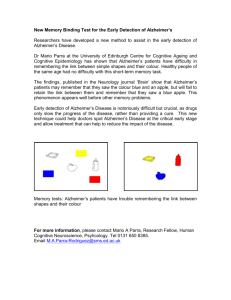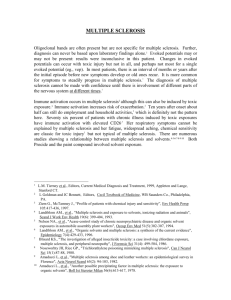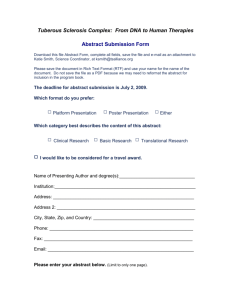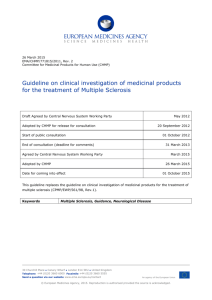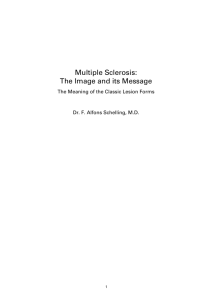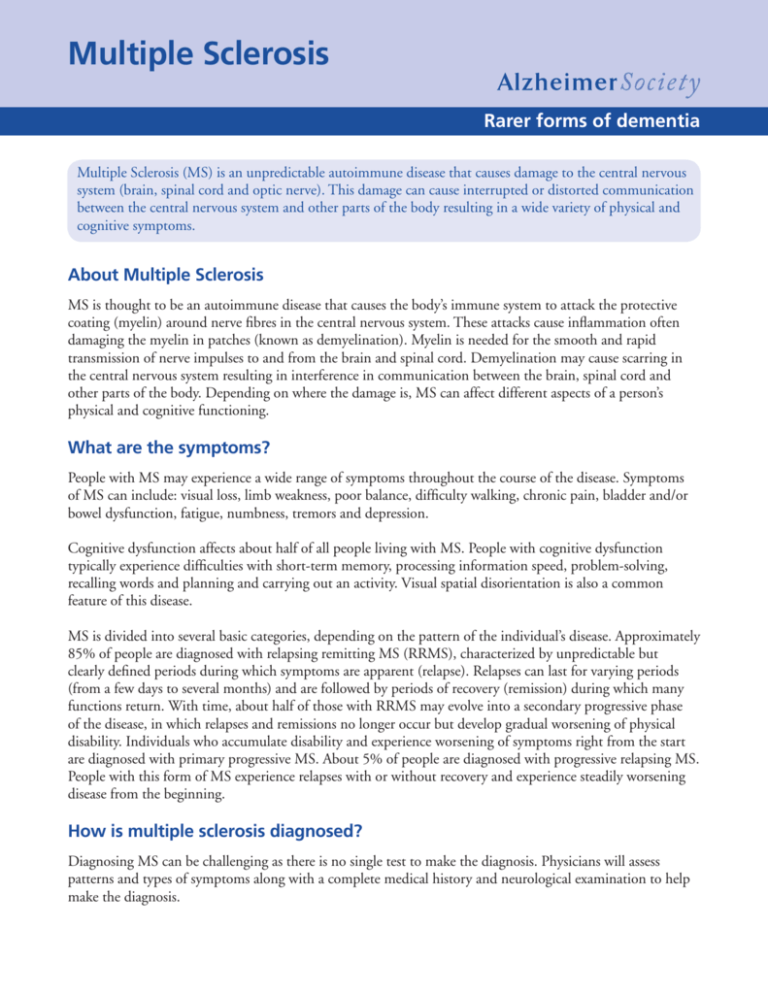
Multiple Sclerosis
Rarer forms of dementia
Multiple Sclerosis (MS) is an unpredictable autoimmune disease that causes damage to the central nervous
system (brain, spinal cord and optic nerve). This damage can cause interrupted or distorted communication
between the central nervous system and other parts of the body resulting in a wide variety of physical and
cognitive symptoms.
About Multiple Sclerosis
MS is thought to be an autoimmune disease that causes the body’s immune system to attack the protective
coating (myelin) around nerve fibres in the central nervous system. These attacks cause inflammation often
damaging the myelin in patches (known as demyelination). Myelin is needed for the smooth and rapid
transmission of nerve impulses to and from the brain and spinal cord. Demyelination may cause scarring in
the central nervous system resulting in interference in communication between the brain, spinal cord and
other parts of the body. Depending on where the damage is, MS can affect different aspects of a person’s
physical and cognitive functioning.
What are the symptoms?
People with MS may experience a wide range of symptoms throughout the course of the disease. Symptoms
of MS can include: visual loss, limb weakness, poor balance, difficulty walking, chronic pain, bladder and/or
bowel dysfunction, fatigue, numbness, tremors and depression.
Cognitive dysfunction affects about half of all people living with MS. People with cognitive dysfunction
typically experience difficulties with short-term memory, processing information speed, problem-solving,
recalling words and planning and carrying out an activity. Visual spatial disorientation is also a common
feature of this disease.
MS is divided into several basic categories, depending on the pattern of the individual’s disease. Approximately
85% of people are diagnosed with relapsing remitting MS (RRMS), characterized by unpredictable but
clearly defined periods during which symptoms are apparent (relapse). Relapses can last for varying periods
(from a few days to several months) and are followed by periods of recovery (remission) during which many
functions return. With time, about half of those with RRMS may evolve into a secondary progressive phase
of the disease, in which relapses and remissions no longer occur but develop gradual worsening of physical
disability. Individuals who accumulate disability and experience worsening of symptoms right from the start
are diagnosed with primary progressive MS. About 5% of people are diagnosed with progressive relapsing MS.
People with this form of MS experience relapses with or without recovery and experience steadily worsening
disease from the beginning.
How is multiple sclerosis diagnosed?
Diagnosing MS can be challenging as there is no single test to make the diagnosis. Physicians will assess
patterns and types of symptoms along with a complete medical history and neurological examination to help
make the diagnosis.
Brain imaging (MRI) is often used to detect any damage to the brain and spinal cord. A diagnosis of MS
must include evidence of disease activity separated in time (lesions that formed at different points in time)
and space (lesions in at least two separate areas of the CNS). The diagnosis of MS is made once other
potential causes have been ruled out. Special tests may help to identify any abnormalities in the brain that
are associated with MS. A spinal tap (lumbar puncture) may help to identify the presence of a specific protein
found in the cerebrospinal fluid known to be present in MS. A spinal tap can also help to rule out other
conditions. An evoked potential test may be used to assess the rate of electrical impulses produced in
a person’s nervous system in response to stimuli.
What are the causes or the risk factors?
While the exact cause of MS is not known, current research increasingly points to a complex interplay of
environmental and possibly genetic risk factors. These factors may influence a risk for developing MS given
a prescribed set of conditions which are yet to be discovered.
Researchers are investigating whether certain risk factors, such as gender, age, family history or lifestyle habits
impact a person’s susceptibility to MS.
Is there treatment?
Currently, there is no known cure for MS. Different medications are used to help slow the progression of the
disease, reduce relapses, decrease the severity of the attacks and to manage some of the symptoms of MS.
Therapeutic approaches are also supporting people living with MS to effectively manage symptoms of their
disease. Physical therapy and rehabilitation can maintain or improve physical functioning throughout the
progression of the disease. Treatment may also be focused on promoting healthy lifestyles through proper
nutrition, exercise, self-care and rest.
Support is available:
Visit the Alzheimer Society’s website at www.alzheimer.ca or contact your local Alzheimer Society.
For more information on MS, please visit the Multiple Sclerosis Society of Canada website
https://beta.mssociety.ca/
Additional resources:
•
lzheimer’s Society UK: A
http://www.alzheimers.org.uk/site/scripts/documents_info.php?documentID=135 •
ultiple Sclerosis Society of Canada: M
http://mssociety.ca/en/pdf/Cognition-and-MS.pdf
2 © January 2015, Alzheimer Society of Canada. All rights reserved.
Rarer forms of dementia - Multiple Sclerosis
The content of this document is provided for information purposes only, and does not represent advice,
an endorsement or a recommendation, with respect to any product, service or enterprise, and/or
the claims and properties thereof, by the Alzheimer Society of Canada. This information sheet is not
intended to replace clinical diagnosis by a health professional.
Sources:
Alzheimer Europe, Cognitive Dysfunction in Multiple Sclerosis
http://www.alzheimer-europe.org/Dementia/Other-forms-of-dementia/Other-Rare-Causes-of-Dementia/CognitiveDysfunction-in-Multiple-Sclerosis?#fragment-2
Alzheimer’s Society UK, Rarer Causes of Dementia
http://www.alzheimers.org.uk/site/scripts/documents_info.php?documentID=135
Mayo Clinic, Diseases and Conditions – Multiple Sclerosis
http://www.mayoclinic.org/diseases-conditions/multiple-sclerosis/basics/definition/con-20026689
Multiple Sclerosis International Federation, Cognition and Emotional Changes http://www.msif.org/about-ms/symptoms-of-ms/cognition-and-emotional-changes/
Multiple Sclerosis Society of Canada, Cognition and MS
http://mssociety.ca/en/pdf/Cognition-and-MS.pdf
Multiple Sclerosis Society of Canada, What is MS https://beta.mssociety.ca/about-ms/what-is-ms
Alzheimer Society of Canada
20 Eglinton Avenue West, 16th Floor, Toronto, Ontario, M4R 1K8
Tel: 416-488-8772 • 1-800-616-8816 • Fax: 416-322-6656
E-mail: info@alzheimer.ca • Website: www.alzheimer.ca
Facebook : www.facebook.com/AlzheimerSociety • Twitter : www.twitter.com/AlzSociety
R300-34E 2015

